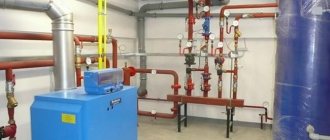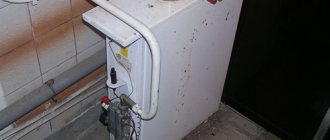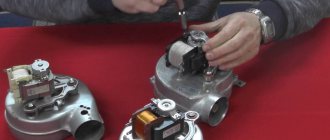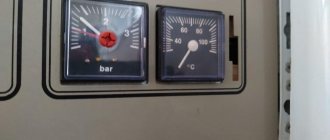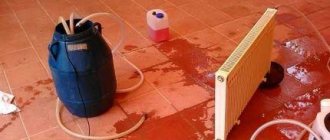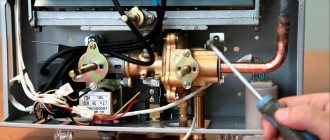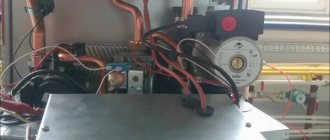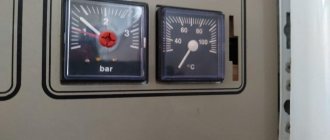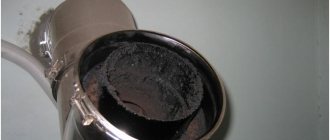In order for the heating system to work efficiently and to avoid breakdowns, it is necessary to maintain and check all elements of the system. Breakdowns can happen in different ways and for different reasons. Very often you hear extraneous noise in the system. There is also a sound in a gas boiler, similar to a whistle. But under no circumstances should such a problem be ignored. Since other malfunctions may occur, and, consequently, deterioration in the performance of the boiler. Or the heating device will stop working altogether. A whistling sound in a gas boiler may indicate one or more problems. They need to be found and eliminated. If this is not done, then an emergency situation will occur. You can look for the cause of the whistling yourself or trust qualified specialists. In our article we will look at the possible causes of whistling in a gas boiler.
Reasons why a gas boiler whistles
The most common reasons why a gas boiler whistles are:
- the heat exchanger is clogged;
- fan problem;
- The coolant is saturated with oxygen.
The heat exchanger is clogged
If there is no filter at the entrance to the gas boiler, then scale will accumulate in the heat exchanger over time. Sediment builds up on the walls of the circuit, and over time begins to accumulate on other nodes.
In a clogged heat exchanger, heat transfer deteriorates. As a result, the unit's efficiency decreases and it may make strange sounds, such as whistling.
Sometimes tapping sounds are also heard - they are produced by broken pieces of scale, which, under the influence of water movement, hit the metal walls of the heat exchanger.
…
To get rid of extraneous noise, you should clean the circuit and the entire heating system. In household chemical stores you can find special chemicals that clean out all the scale well.
For prevention purposes, it is necessary to install a filter on the water supply.
Fan problem
The fan in a gas boiler with a closed combustion chamber plays an important function - it removes smoke to the street and facilitates the supply of oxygen to the burner. If there is a malfunction, whistling and noise may occur. More often, this problem occurs if the lubricant has dried out or the element is located above the burner. Then the fan wears out faster.
To solve the problem with the fan, you should call a specialist.
Find out here what to do if your gas boiler blows out?
…
Possible malfunctions of a gas boiler and ways to eliminate them
Why doesn't the gas boiler light up?
The coolant is oversaturated with oxygen
Often the reason why a gas boiler whistles in a private house is an excessive amount of oxygen in the coolant. This problem mainly appears in models with an open type of combustion chamber. When a large volume of oxygen enters the heating system, many air bubbles are formed during the heating process. When they move, a sound appears like a boiling kettle, sometimes accompanied by a whistle.
Oversaturation of the coolant with oxygen does not pose a threat to the equipment. Such noise does not indicate the presence of any damage, but it definitely creates discomfort for others.
To prevent excess air from appearing, it is necessary to make some changes to the heating system:
- the expansion tank must have a membrane;
- install an air vent on the equipment;
- purchase a weather-compensating thermostat.
A whistle may also appear due to a lack of coolant in the system. In this case, the boiler begins to overheat and make noise.
How to remove an air lock with your own hands
Air in the system after a long stop is common. This problem arises not only in the private sector, but also in apartment buildings. It's quite easy to solve.
Heating radiators are equipped with Mayevsky taps located at the ends of the radiators. This could be a valve or a fitting with a notch for a screwdriver.
How to fix:
- armed with a small container (for draining water), you need to unscrew the tap and let out the air;
- Actions should be performed carefully so as not to get burned by the escaping steam;
- when water comes out of the hole, close the valve;
- Such manipulations are carried out on each battery.
This eliminates noise and allows the coolant to move freely through the system, evenly releasing heat.
Other causes of whistling
The gas unit may whistle due to:
- Excessive pressure formation in the pump. It needs to be adjusted, otherwise the increased pressure may cause an accident.
- Incorrectly adjusted valve. Problems arise when setting up the bypass.
- Valve rattling.
In addition to the main ones, there are indirect reasons why a gas boiler whistles:
- the settings are incorrect;
- the boiler is not connected correctly;
- nodes are worn out.
Fan
Without this component, it is difficult to implement the functioning of the heating network. Thanks to it, combustion products are eliminated from the operating apparatus, and the system is blown to eliminate smoke. If it malfunctions, the gas boiler whistles during operation. True, this phenomenon occurs quite rarely in new models. And if the boiler has been working for you for more than a year, then this is a very common factor.
If there is no lubrication or position of the fan above the burner, it will quickly deteriorate. Because the lubricant in the bearings has dried out and they wear out quickly. The solution is to disassemble the fan and lubricate the parts.
Also, the fan blades may become unbalanced and dirt and dust may accumulate on them. Then they are cleaned and their rotation is adjusted.
It is possible to completely replace the fan; for this it is better to invite a specialist. Then you won't have to buy a new model.
Noises during ignition
Sometimes users are interested in why the burner in a gas boiler whistles when ignited. Perhaps the reason lies in unstable gas pressure. It is necessary to measure it and, if necessary, contact the gas service.
It happens that when the burner is ignited, loud pops occur. This sound indicates a high concentration of gas formed in the burner chamber. It bursts into flames when ignited. In this case, the ignition unit and its elements should be diagnosed.
Another possible malfunction of the boiler when igniting is knocking sounds. This is a symptom that the wick or chimney in the unit is clogged. If you clean them, the problem will go away.
When a double-circuit gas unit whistles when hot water is turned on, the cause may be clogged nozzles. It is necessary to turn off the gas supply and clean the clogged nozzles.
Models
Experts recommend installing reliable sensors, "Junkers", "Eurosit" and "Sitgroup"
They can be mounted in various models: wall, floor and speakers.
In case of the indicated difficulties, the boilers may not turn on or turn off quickly, for example, if the Gaslux gas boiler beeps and does not turn on, then you can do the following:
- Check the chimney system and clean it if necessary.
- Check equipment installation.
- Fill up the device to 1.5 bar.
- Replace sensor.
If that doesn't help, call a repairman.
Reasons for whistling of certain brands of gas boilers
Baxi
Common reasons why baxi gas boilers whistle are:
- errors in adjusting the gas valve;
- high gas pressure;
- Burner device clogged.
Mimax
Mimax gas boilers whistle for the following reasons:
- lack of water;
- insufficient air flow.
Navien
Navien units make a whistle due to:
- clogging of the heat exchanger or burner;
- problems with the pump.
How to avoid knocking
When the reason why the heating boiler is knocking has been identified and the equipment has undergone the necessary maintenance, the owner’s main task is to prevent the emergency from occurring again. To do this, it is enough to carry out preventive maintenance before each heating season, when the installation is not in active mode. This work consists of several simple procedures:
- Once a year, it is necessary to remove the cover of the unit housing and clean the main elements from dust and other contaminants. The best option would be to purchase a portable compressor and clean the parts with a compressed air gun.
- If regular blowing does not help, the boiler can be flushed under high water pressure when it is turned off. Before starting operation, all parts must be dry, so this work is best done in the summer.
- If pipes, fittings, pipes, valves or taps become overgrown with rust, it must be removed. This problem is possible not only when corrosion occurs, but also when there is a high content of iron oxides in running water from a well. Deferrization of a liquid medium is carried out by introducing into the coolant composition special chemicals that are widely available for sale.
- At the inlet of clean water from the well to the rear, a reverse osmosis system with replaceable filter cassettes should be installed. This will help clean the liquid medium from foreign impurities and significantly soften the composition of the water.
The best solution for the prevention of boiler equipment would be to conclude an operating agreement with a specialized organization. According to a pre-agreed schedule, professionals will not only carry out routine maintenance and cleaning of the installation, but will also identify minor deficiencies and correct them in advance.
The video contains more information about the prevention of gas boiler installations
Scale formation
A high salt content in water leads to scale deposits on the walls of the device. When heated, the salts will make themselves known by hissing. Because of this, the device heats up much more slowly. The radiator needs to be cleaned once a year. To do this, you will need a reagent, a special pump through which the reagent is poured into the device and rinses it from the inside.
Scale in the boiler - how to deal with it
In radiators, water does not move as quickly as in pipes, and the sedimentation of suspended matter is many times higher. Regular cleaning of radiators is necessary. You can flush the entire system at once or separately the radiators using a compressor unit. To flush, the radiator is connected to the compressor, and dirt is cleaned from it with water pressure.
Sometimes it is enough to simply flush the system with strong water pressure. Chemical reagents are used in cases where the situation with scale deposits is extremely advanced.
Scale formation deforms the device
Under the influence of chemicals, cracks may form in radiators that were clogged with salts. In order to prevent an emergency, before starting the system, all equipment must be checked for readiness for operation.
Infrared heating panels

